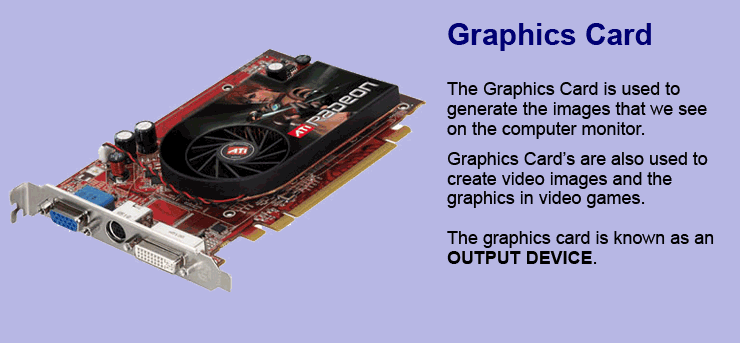A graphics card is a display adapter used in most computers that handles what is displayed on the computer screen or monitor. It is a printed circuit board that houses RAM and a processor. It also has a Basic Input Output System (BIOS) that creates the interface for hardware and software to interact. BIOS also performs diagnostics on the memory and stores the card’s settings. The graphics processing unit (GPU) is the card’s processor that works similar to a computer's CPU. The difference is that the GPU is specifically designed for executing the complex geometric and mathematical calculations to display images on screen. A GPU is normally located under a fan or heat sink because of the amount of heat it produces to function properly.

The graphics card uses four other components to accomplish its task of displaying graphical data with color, high clarity, definition and overall appearance:
- The motherboard connection for data and power or a direct connection to the power supply
- The processor to determine how to place each pixel on the screen
- Memory is used to temporarily store completed pictures and information about each pixel
- The monitor connection to display the final result
The graphics card has the demanding job of creating images out of binary data. Software applications and the CPU work together to send information about the image to the graphics card. The graphics card choses how to use the pixels on the screen to create the image while adding color, lighting and texture. The information is then sent to the monitor via a cable to be displayed on the screen. A computer goes through this process about sixty times per second for fast-paced games. Without the calculations performed by the graphics card, the workload would be too much for the computer to handle (Stuff, 2020).
What to Consider When Looking for a Graphics Card
There are a lot of considerations to think about when figuring out which graphics card for gaming is best for you. The first is to be sure that it is capable of displaying the best resolution possible for your monitor and that your monitor can handle the given card. The second is the on-board memory that the card can handle because graphics cards work extremely hard and fast to render (display) images on a screen. This is due to the fact that it is rendering graphic images that are much larger files than that of text files. This process generates tons of heat and thus more expensive cards utilize built-in fans to dissipate the heat more effectively. It is ideal to find a graphics card that relies on its own memory chips to perform this function as it is going to give you better graphics and faster speeds, which equals a better gaming experience for you. Less robust cards may be able to perform these functions but will end up relying on the RAM of the computer which takes away from the users experience while gaming (Kayne, 2020).
Let'sTalk About FPS
Framerate or FPS is an important benchmark that a gamer looks for in a graphics card. Like videos, games are displayed on screen via a fast sequence of images. The images, known as frames, are created by the video card using the data received from the games program running on the PC. Framerate is the number of frames or images a system can display every second. A graphics card with a low framerate can cause images to be choppy or the game will appear to lag. The more powerful a graphics card or GPU is, the higher its FPS, which results in the smooth running of a game. The FPS recommendation is that the maximum FPS should be limited to the maximum refresh rate of the monitor. It is also important to factor in a monitor that works with the capabilities of the graphics cards. Afterall, what is the point of paying for an expensive graphics card that can make hundreds of FPS when the monitor only has a refresh rate of 60 (Maiochi, 2019).